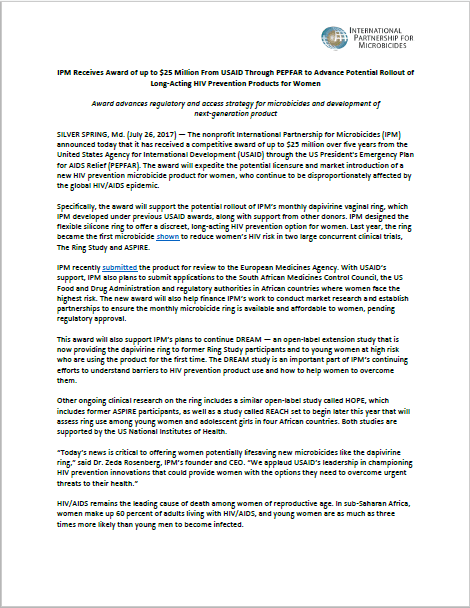IPM Receives Award of up to $25 Million From USAID Through PEPFAR to Advance Potential Rollout of Long-Acting HIV Prevention Products for Women
Award advances regulatory and access strategy for microbicides and development of next-generation product
SILVER SPRING, Md. (July 26, 2017) — The nonprofit International Partnership for Microbicides (IPM) announced today that it has received a competitive award of up to $25 million over five years from the United States Agency for International Development (USAID) through the US President's Emergency Plan for AIDS Relief (PEPFAR). The award will expedite the potential licensure and market introduction of a new HIV prevention microbicide product for women, who continue to be disproportionately affected by the global HIV/AIDS epidemic.
Specifically, the award will support the potential rollout of IPM’s monthly dapivirine vaginal ring, which IPM developed under previous USAID awards, along with support from other donors. IPM designed the flexible silicone ring to offer a discreet, long-acting HIV prevention option for women. Last year, the ring became the first microbicide shown to reduce women’s HIV risk in two large concurrent clinical trials, The Ring Study and ASPIRE.
IPM recently submitted the product for review to the European Medicines Agency. With USAID’s support, IPM also plans to submit applications to the South African Medicines Control Council, the US Food and Drug Administration and regulatory authorities in African countries where women face the highest risk. The new award will also help finance IPM’s work to conduct market research and establish partnerships to ensure the monthly microbicide ring is available and affordable to women, pending regulatory approval.
This award will also support IPM’s plans to continue DREAM — an open-label extension study that is now providing the dapivirine ring to former Ring Study participants and to young women at high risk who are using the product for the first time. The DREAM study is an important part of IPM’s continuing efforts to understand barriers to HIV prevention product use and how to help women to overcome them.
Other ongoing clinical research on the ring includes a similar open-label study called HOPE, which includes former ASPIRE participants, as well as a study called REACH set to begin later this year that will assess ring use among young women and adolescent girls in four African countries. Both studies are supported by the US National Institutes of Health.
“Today’s news is critical to offering women potentially lifesaving new microbicides like the dapivirine ring,” said Dr. Zeda Rosenberg, IPM’s founder and CEO. “We applaud USAID’s leadership in championing HIV prevention innovations that could provide women with the options they need to overcome urgent threats to their health.”
HIV/AIDS remains the leading cause of death among women of reproductive age. In sub-Saharan Africa, women make up 60 percent of adults living with HIV/AIDS, and young women are as much as three times more likely than young men to become infected.
The USAID award will also help speed the development of, and the regulatory process for, a next-generation product — a three-month dapivirine-only ring that would offer women greater convenience and reduce the ring’s annual cost because women would only need four rings per year.
Dapivirine is a non-nucleoside reverse transcriptase inhibitor that works by blocking HIV’s ability to replicate itself inside a healthy cell. IPM holds an exclusive worldwide license for dapivirine from Janssen Sciences Ireland UC, part of the Janssen Pharmaceutical Companies of Johnson & Johnson, and holds royalty-free licenses for eight other ARVs from five major pharmaceutical partners. These licenses help ensure that women in low-resource settings have affordable access to future microbicides.
Today’s announcement follows four previous awards from USAID, bringing the institution’s total committed investment in IPM to date up to $91 million. IPM also receives generous support from the Flanders Department of Foreign Affairs, Irish Aid, the German Federal Ministry of Education and Research (BMBF) through the KfW Development Bank, the Ministry of Foreign Affairs of the Netherlands, UK aid from the United Kingdom government, and the Bill & Melinda Gates Foundation.
About IPM: IPM is a nonprofit organization that developed the monthly dapivirine vaginal ring, and is dedicated to developing other new HIV prevention tools and sexual and reproductive health technologies for women, and making them available in developing countries. Our partnerships with public, private and civil society bring scientific ingenuity, political will and financial resources to bear on developing and delivering products designed to have significant public health impact. IPM has offices in the United States, South Africa and Belgium. Visit us at www.IPMglobal.org.
Media contacts:
IPM Global: Holly Seltzer, hseltzer@IPMglobal.org, +1.301.608.4277
IPM Africa: Leonard Solai, lsolai@IPMglobal.org, +27.84.660.6776
